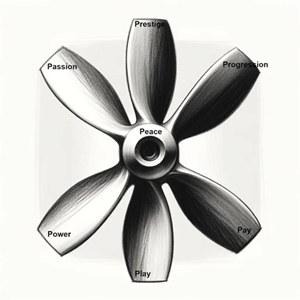2024 | Volume 25 | Issue 5

Author: Dr Wikus Vermeulen
On a short flight from Tāmaki Makaurau Auckland to Tauranga, the hum of a turboprop engine sparked a simple analogy that had been simmering for 25 years—the Propeller Theory.
For years, a career in medicine felt like following a preset path, one goal leading to another, with little room for innovation. But in my 30s, I found myself feeding an intellectual beast that was never satisfied. I experienced a pre-midlife intellectual crisis when in conversations with anaesthetists, which led me to pursue an MBA in international healthcare. This decision opened a new world, laying the foundation for the Propeller Theory.

The 6Ps of the propellor
Introduction
Understanding human motivation and achieving inner peace has been a profound interest throughout history. This exploration presents an innovative perspective using the analogy of an aeroplane propeller to elucidate human motivations. The theory posits six primary motivators, conceptualised as the blades of a propeller, which must be balanced for a harmonious and fulfilling life. The central hub of the propeller represents inner peace—the equilibrium point from which effective life propulsion emanates.
The core components: the six blade Ps of the propeller
Pay
The first blade represents pay, symbolising financial gain and material wealth. Historically, the pursuit of money has driven human behaviour, viewed as essential for a successful life. However, an overemphasis on money can lead to 'commodity fetishism’, distorting social relations and personal fulfilment. The balance between financial motivations and ethical considerations is crucial for personal fulfilment.
Prestige
The second blade, prestige, pertains to the desire for recognition, respect, and social status. Friedrich Nietzsche's 'will to power' argues that individuals are driven by an intrinsic desire to assert dominance and achieve higher status. Prestige aligns with esteem needs—encompassing achievements, respect from others, and self-respect. Excessive focus can result in narcissism and fragile self-esteem contingent on external validation.
Power
The third blade involves the desire to influence and control one's and others’ environment. This motivator is critical for personal agency and autonomy. Carl Jung's theories suggest that self-development involves integrating various aspects of the psyche, including repressed desires. Ethical leadership, balancing power with other motivational drives, ensures responsible use of power.
Play
The fourth blade represents the pursuit of pleasure, leisure, and enjoyment. Sigmund Freud's pleasure principle highlights the human tendency to seek immediate gratification and avoid pain. Contemporary theories recognise the importance of play and leisure in enhancing productivity and creativity. Mihaly Csikszentmihalyi's concept of 'flow' describes complete immersion in activities, leading to increased satisfaction. However, excessive indulgence can lead to escapism and addiction.
Passion
The fifth blade, passion, encompasses romantic and sexual motivations. Freud's psychoanalytic theories emphasised the significance of sexual drives in shaping behaviour. Modern psychological theories recognise passion's role in fostering intimate connections and personal fulfilment. Robert Sternberg's triangular theory of love identifies passion as one of love's three components, alongside intimacy and commitment. However, imbalance can result in obsessive behaviour.
Progression
The sixth blade, progression, represents personal development and having a sense of purpose. This motivator is essential for fostering growth, learning, and a forward-looking perspective. Aristotle's concept of eudaimonia is related to personal development, emphasising that true happiness is found in pursuing virtue and excellence. Modern psychology's Self-Determination Theory identifies autonomy, competence, and relatedness as crucial for personal development.
Inner Peace: the propeller’s hub
At the centre of the propeller lies inner peace—the fulcrum around which the blades revolve. Inner peace is the state of mental and emotional equilibrium achieved when the six motivational components are balanced. Philosophical and psychological traditions have long explored inner peace. Eastern philosophies, such as Buddhism and Taoism, emphasise balance and harmony. Western existentialist philosophers, including Jean-Paul Sartre and Viktor Frankl, focus on finding meaning in life.
An aeroplane propeller can function with anywhere from two to six blades. Analogously, individuals driven by fewer motivational forces can still achieve balance. Interestingly, the more blades a propeller has, the less noisy it becomes. Similarly, a person with a well-rounded set of motivations glides through life more smoothly and with less friction.
This comprehensive framework offers a holistic approach to achieving a balanced and fulfilling life, ensuring that each motivational component contributes positively to overall wellbeing.
You can read the complete article and the dangers of an unbalanced propellor here. (PDF 407.28KB)